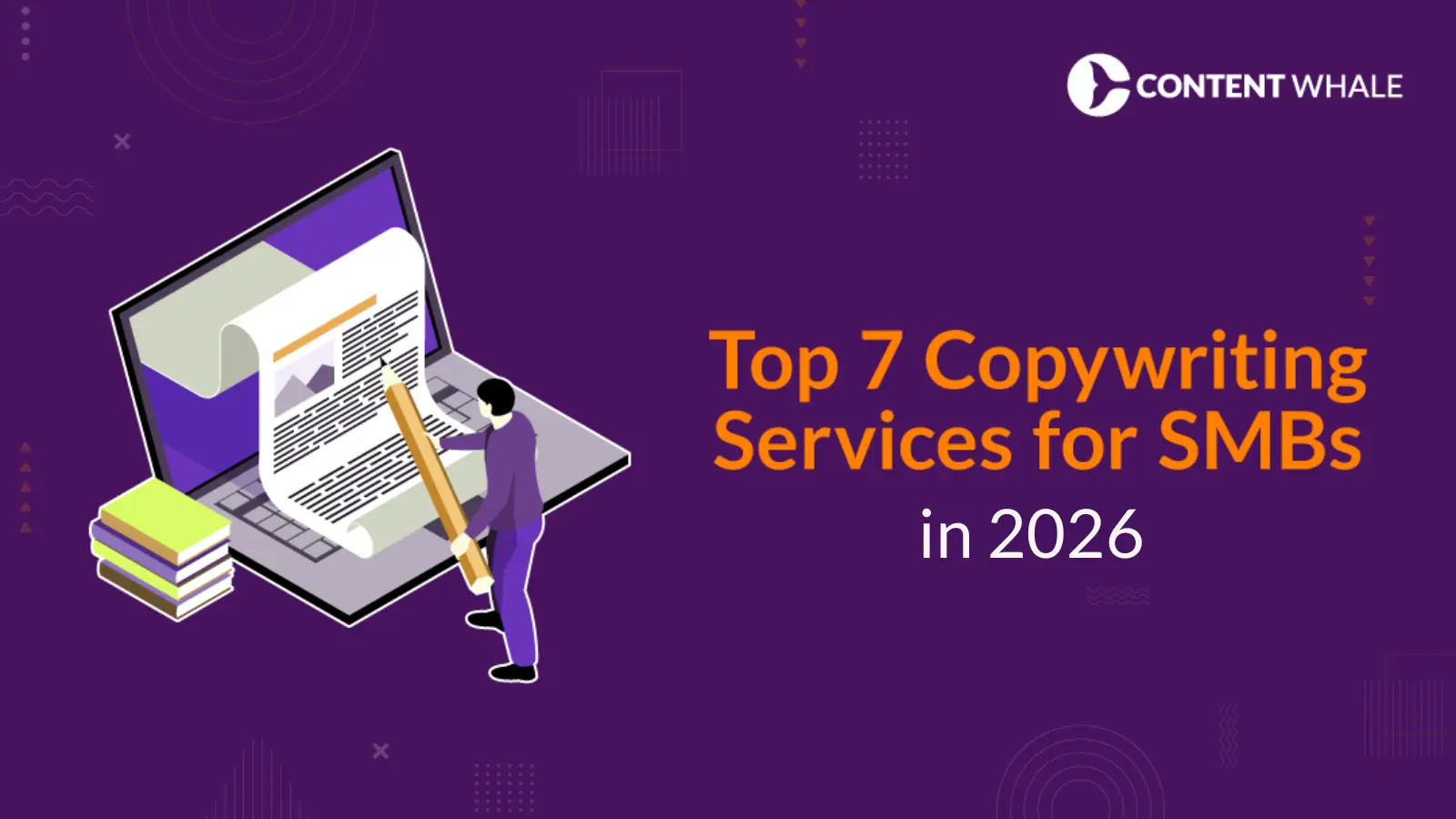Good copywriting has a direct impact on your audience’s engagement and ultimately, your conversions. Whether you’re crafting a headline, a product description, or a sales page, effective copy helps you connect with your readers and move them to take action. But how do you consistently improve copywriting skills to keep pace with evolving marketing trends?
This article will provide you with seven actionable, data-backed copywriting strategies proven to enhance the quality of your writing. Each tip is grounded in research and designed to help you write better, more engaging, and persuasive copy.
From using active voice to focusing on benefits over features, these writing techniques will not only improve your writing but also ensure that your content is optimized for conversions.
Ready to learn more? Let’s dive into these copywriting tips that will help you improve writing effectiveness and transform your content.
1. Use Active Voice for Clarity and Engagement
Active voice is essential for improving copywriting skills. It makes your copy clear, concise, and easier to read, ultimately boosting engagement. Here’s why:
a) Why Active Voice Works:
- Direct Communication: Active voice ensures the subject performs the action, making sentences more direct and impactful. Compare, “Our team designed the product” to “The product was designed by our team.” The former is clearer and more engaging.
- Improves Clarity: Research highlights that sentences written in active voice are easier to understand, which is vital when you’re crafting conversion-focused writing. Clear copy ensures readers grasp your message quickly without confusion.
- Build Engagement: Active sentences are naturally more dynamic. This keeps your readers engaged, increasing the likelihood they will continue reading and take action. When your audience understands your message effortlessly, they’re more likely to convert.
b) Tips to Use Active Voice Effectively:
- Identify the Doer: Make sure the subject is the one performing the action in your sentence.
- Use Strong Verbs: Avoid weak verbs like “is” or “was.” Replace them with more powerful verbs to create direct, punchy sentences. For example, “The team completed the project” instead of “The project was completed.”
- Avoid Passive Structures: Watch out for passive phrases such as “was done” or “is being created.” Instead, rewrite them in active voice for a clearer message.
c) Benefits of Active Voice:
- Enhances persuasive copy by making it more engaging.
- Simplifies complex ideas, improving overall writing effectiveness.
- Ensures clarity, a hallmark of copywriting best practices.
2. Write Short, Concise Sentences
Short, concise sentences are key to improving writing effectiveness. They not only increase readability but also help maintain your audience’s attention, making it easier for them to absorb information quickly. Research shows that sentences with around 11-14 words are considered easy to read, while anything beyond 25 words becomes challenging for most readers. This balance is crucial for crafting conversion-focused writing.
a) Why Concise Sentences Work:
- Improved Readability: Short sentences allow readers to grasp the message faster without getting bogged down by unnecessary complexity. The shorter the sentence, the easier it is to follow.
- Increased Engagement: Breaking down long ideas into concise sentences helps maintain the reader’s attention, reducing the chances of them skipping sections or leaving the page altogether.
- Simpler Comprehension: Especially in copywriting, simplicity and brevity are essential. Using concise sentences ensures your copywriting tips are clear and actionable for the audience.
b) Tips for Writing Concise Sentences:
- Cut unnecessary words: Eliminate redundant phrases and keep only essential information.
- Use simple words: Opt for clear, familiar language over complex terms.
- Keep one idea per sentence: This avoids overloading the reader with too much information at once.
3. Focus on Benefits, Not Features
When writing copy, a critical data-backed copywriting strategy is to emphasize the benefits your product or service provides rather than just listing its features. Features are what a product does; benefits are how it improves the customer’s life. This shift in focus will directly enhance your copywriting skills and help create more conversion-focused writing.
a) Why Benefits Matter:
- Addresses Customer Needs: Customers care about how your product solves their problems or fulfills a need. For example, instead of stating that a blender has a 1000-watt motor (a feature), emphasize that it “makes smoothies in seconds, giving you more time to enjoy your day” (the benefit). This emotional appeal is what drives people to make a purchase.
- Creates Emotional Connection: People make purchasing decisions based on emotions like convenience, security, or happiness. By showcasing how your product will enhance their life, you tap into these emotions and increase the likelihood of conversion.
b) How to Turn Features into Benefits:
- Identify the Core Problem: Understand what issue your product solves for the customer.
- Flip the Feature: Instead of listing specs, explain how each feature brings value to the user. For example, “Our platform has 24/7 customer support” can become “Get help anytime, ensuring you never face downtime.”
4. Use Power Words to Persuade and Influence
Power words are a powerful tool in copywriting, designed to evoke emotions and motivate readers to take action. These words can turn a simple sentence into something that engages, persuades, and drives conversions. Research shows that using persuasive copy with well-chosen power words can significantly improve copywriting skills by creating stronger emotional connections with your audience.
a) Why Power Words Work:
- Emotional Triggers: Power words like “amazing,” “exclusive,” or “guaranteed” tap into readers’ desires, fears, and emotions. For instance, “exclusive” creates a sense of scarcity, making readers feel they’re accessing something special. These words create urgency and persuade readers to act quickly.
- Boosts Conversions: Words such as “free,” “limited,” and “proven” provide a sense of security and immediate benefit, which are critical for conversion-focused writing. Incorporating these into your copy compels readers to engage and trust your message.
b) Where to Use Power Words:
- Headlines and Subheadings: Grabbing attention early is crucial. Power words here can spark curiosity and draw readers in.
- Calls to Action (CTAs): Words like “discover” or “unlock” encourage readers to take the next step.
- Benefit Bullets: Highlighting product benefits with power words strengthens your pitch and makes it more persuasive.
| # | Benefit | Description |
| 1 | Triggers Emotional Response | Power words evoke strong emotions like excitement, urgency, or trust, encouraging readers to take action. |
| 2 | Improves Conversion Rates | Words like “free,” “exclusive,” or “limited-time” tap into psychological triggers, driving more conversions. |
| 3 | Captures Attention Quickly | Power words stand out, grabbing readers’ attention in headlines, emails, and calls-to-action. |
| 4 | Simplifies Complex Ideas | Using strong, direct language helps communicate ideas more clearly and concisely, making the message easy to understand. |
| 5 | Creates a Sense of Urgency or Scarcity | Words such as “limited,” “last chance,” or “hurry” create urgency, prompting quicker decision-making. |
| 6 | Enhances Persuasion by Building Trust | Words like “guaranteed,” “proven,” and “secure” help build credibility, making your message more persuasive. |
| 7 | Encourages Positive Emotional Reactions | Power words such as “amazing,” “incredible,” and “life-changing” boost enthusiasm and emotional engagement. |
| 8 | Appeals to Exclusivity | Words like “members only” and “exclusive” make readers feel special, enhancing their desire to engage. |
| 9 | Supports Community and Belonging | Words like “join” or “become a member” encourage readers to feel part of a community, fostering loyalty. |
| 10 | Drives Immediate Action | Action words like “now” and “instantly” push readers towards taking swift, decisive actions. |
5. Incorporate Data and Statistics to Build Trust
Incorporating data-backed copywriting strategies is a proven way to enhance credibility and build trust with your audience. Statistics provide concrete evidence that supports your claims, helping readers feel more confident in your message. When your copy is backed by reliable data, it demonstrates that your product or service is grounded in real-world results, making it more persuasive.
a) Why Data Matters:
- Boosts Credibility: Statistics make your copy more believable by providing factual evidence. For example, if you claim that your software improves productivity, citing research or statistics that support this can be incredibly convincing.
- Enhances Persuasion: Numbers have a way of simplifying complex information and making it more digestible. For instance, stating “Our solution reduces operational costs by 30%” is far more compelling than saying “Our solution saves money.”
- Builds Trust: Consumers are increasingly skeptical of marketing claims, but data-backed information fosters trust. According to recent studies, 75% of consumers make decisions based on the credibility of the data presented to them.
b) Tips for Using Data:
- Integrate Statistics Naturally: Use numbers to reinforce key points, such as product benefits or user outcomes. For example, “Websites using optimized copy see a 40% increase in user engagement.”
- Cite Authoritative Sources: Always use credible and relevant sources like industry reports, government data, or research papers.
- Visualize Data: Charts and infographics make statistics easier to understand and more impactful.
6. Leverage Social Proof to Increase Conversions
Social proof is one of the most effective strategies to build trust and boost conversions. Whether through customer testimonials, user-generated content, or expert endorsements, showcasing real experiences helps establish credibility with potential customers. Studies show that conversion-focused writing benefits greatly from integrating social proof, as it provides the validation that hesitant buyers need to make decisions confidently.
a) Why Social Proof Works:
- Reduces Decision Anxiety: Potential customers are more likely to trust the opinions of their peers. Reviews, ratings, and testimonials act as a reassurance, especially when customers are conflicted or uncertain about a purchase. When buyers see others achieving positive results, they feel more confident following suit.
- Builds Trust and Credibility: Featuring verified customer testimonials or expert endorsements amplifies your product’s credibility. Testimonials, especially when presented authentically, provide a powerful form of persuasive copy that builds trust.
b) Types of Social Proof to Use:
- Customer Testimonials: Include reviews and feedback from satisfied customers. Highlight specific outcomes they achieved to make the copy more compelling.
- User-Generated Content: Encourage customers to share their experiences on social media or review platforms. This not only boosts your brand’s authenticity but also keeps your content fresh and relatable.
- Expert and Celebrity Endorsements: Leverage endorsements from well-known figures in your industry to further enhance your credibility.
7. Optimize for Readability: Use Bullet Points and Subheadings
Readability is one of the most important aspects of creating engaging, conversion-focused writing. Clear formatting helps readers absorb information quickly, which is essential for holding attention and driving conversions. Using bullet points and subheadings effectively can improve writing effectiveness and keep readers engaged longer.
a) Why Bullet Points and Subheadings Matter:
- Enhance Skin Ability: Most readers scan content before committing to reading it fully. Bullet points and subheadings break down complex information into digestible chunks, allowing users to grasp key points immediately. This is especially useful for readers on mobile devices or those short on time.
- Highlight Key Information: Bullet points draw attention to important details, making your content more concise and easier to digest. They are especially effective when listing benefits or outlining steps, helping you improve copywriting skills by simplifying content delivery.
- Improves Structure: Subheadings give structure to your copy, guiding readers through your content effortlessly. They help organize thoughts and create a logical flow, which is crucial for retaining attention and improving engagement.
b) Tips for Using Bullet Points and Subheadings:
- Keep Bullet Points Concise: Ensure each bullet conveys a single, impactful idea.
- Use Descriptive Subheadings: Subheadings should summarize the section’s main idea while incorporating relevant keywords like copywriting tips or writing techniques.
- Leverage White Space: Ensure enough white space around bullet points and subheadings to make your copy visually appealing and less overwhelming.
Conclusion
To wrap up, these seven data-backed copywriting strategies offer actionable ways to improve copywriting skills and boost your content’s impact. From using active voice to creating concise sentences and focusing on benefits, these techniques are proven to enhance writing effectiveness and engagement. By integrating power words, leveraging social proof, and incorporating data, you’ll strengthen your credibility and drive conversions.
Now, it’s time to put these tips into practice. Whether you’re optimizing for readability with bullet points or ensuring that your copy speaks directly to your audience’s needs, each of these strategies is designed to help you write better copy. So, go ahead—apply these insights to your next piece and watch how they transform your content!
At Content Whale, we specialize in crafting high-quality, engaging copy that drives conversions. With a team of experienced writers and data-driven strategies, we excel in creating SEO-friendly content designed to resonate with your audience. Let us help you enhance your brand’s messaging and achieve measurable results.
FAQs
1. How can I make my copywriting more persuasive?
To make your copywriting more persuasive, focus on emotional triggers. Use power words like “free,” “exclusive,” and “proven” to evoke a sense of urgency or excitement. Additionally, focus on the benefits your product or service provides, not just the features.
2. Why is active voice important in copywriting?
Active voice is essential because it makes your writing clear and direct. It ensures that the subject of the sentence performs the action, which makes your copy more engaging and easier to read. Using active voice can improve writing effectiveness and help you communicate your message more efficiently.
3. How do power words improve copywriting effectiveness?
Power words help evoke emotions in your readers, which can drive them to take action. Words like “limited,” “guaranteed,” and “instant” create a sense of urgency and trust, encouraging conversions and improving persuasive copy.
4. How does social proof impact conversions?
Social proof like testimonials, case studies, and reviews build trust with your audience by showing that others have had positive experiences with your product or service. This trust increases conversion rates and encourages potential customers to take action.
5. What tools can I use to measure and improve copywriting readability?
Tools like the Hemingway App and Grammarly are great for improving readability. They highlight complex sentences, passive voice, and common errors, helping you optimize your content for clarity and engagement.





